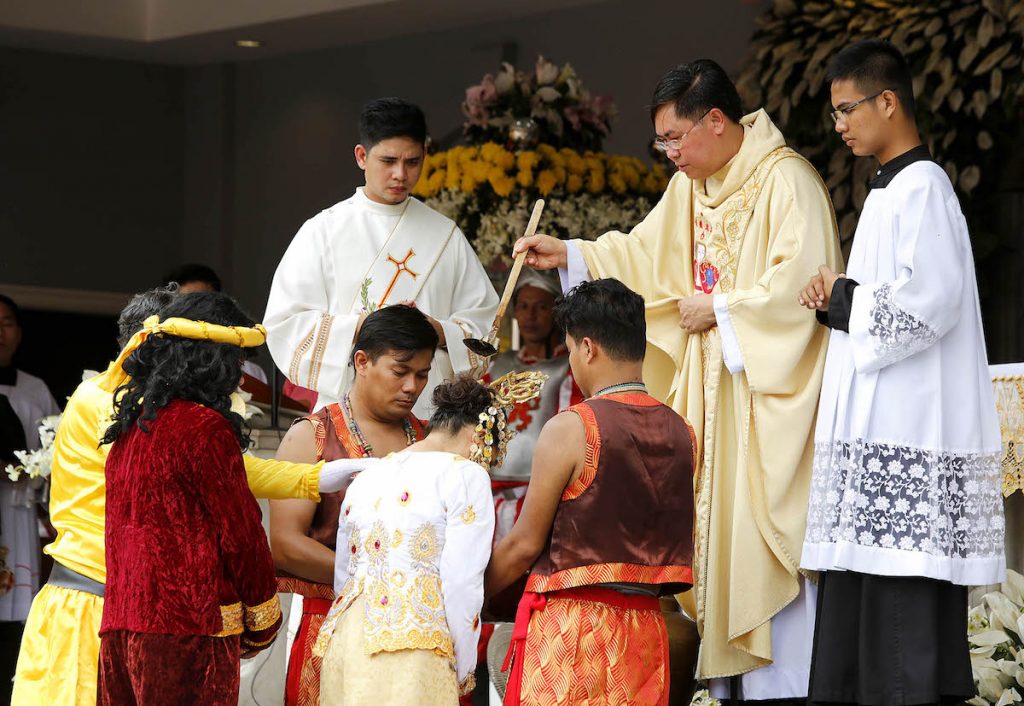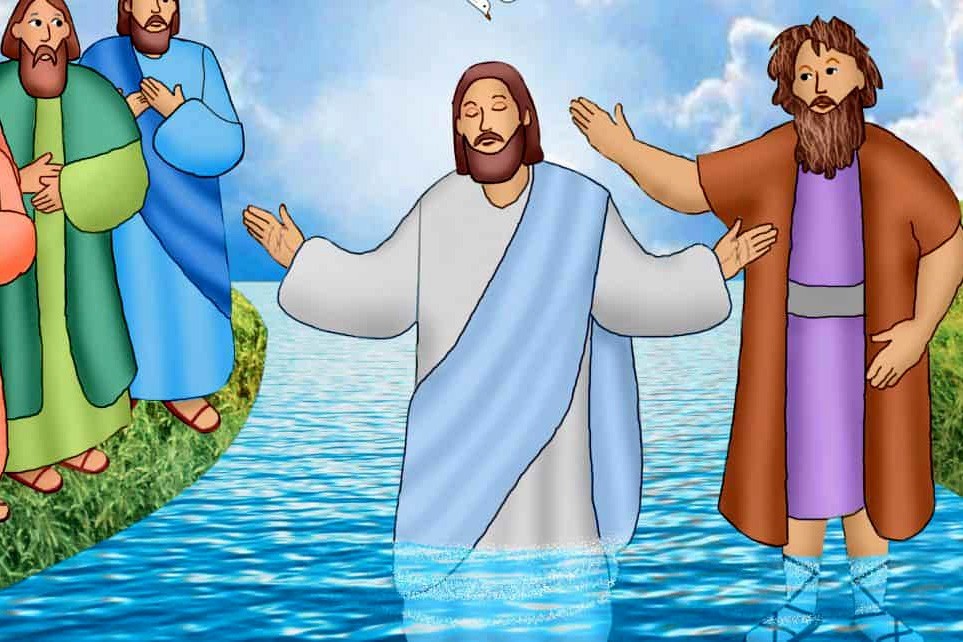We heard John in today’s Gospel distinguishing between the baptism that he was doing and the baptism that was to be given by the Messiah who was to come. He says, “I baptize you with WATER, but there is one mightier than I who is coming…. He will baptize you with the HOLY SPIRIT and FIRE.”
John is explaining that the immersion that he was asking people to undergo ritually at the Jordan river was merely symbolic. It was his way of calling people to conversion, to return to the covenant. He was calling them to a new life, to become a new creation. But ACTUAL PARTICIPATION in that new life is what the coming Messiah will bring about, says John.
It’s like he’s telling us, “Hey guys, this is the REAL THING.” It is Jesus who will bring about that new life. “He will baptize you with the HOLY SPIRIT and FIRE.” Meaning, he offers a life that is—firstly, SPIRITED, and secondly FIRED UP by God.
To understand this, let me first refer you to our traditional Catholic prayer to the Holy Spirit. In this prayer, first, we invoke the Holy Spirit and say, “Come HOLY SPIRIT, fill the hearts of your faithful. And enkindle in them the FIRE OF YOUR LOVE.” The response part is what is borrowed from Psalm 104:30, “Send forth your Spirit and they SHALL BE CREATED, and you SHALL RENEW THE FACE OF THE EARTH.” The prayer is saying two things: first, that when our hearts are filled with the Holy Spirit, we become a new creation.
When I was younger, I remember how we used to say HOLY GHOST instead of Holy Spirit. I think we shifted to Spirit because Ghost does not mean anymore what it originally meant in old English. We have tended to equate them with malevolent supernatural elements. Actually Spirit literally means BREATH. The Greek PNEUMA, which is a translation of the Hebrew RUAH, becomes SPIRITUS in Latin.
To receive the SPIRIT OF GOD means TO BREATHE THE BREATH OF GOD. That is supposedly how God created Adam, according to the story of creation in the book of Genesis. Humankind was supposedly nothing but a piece of clay which God had breathed into. It is God’s breath that supposedly gave us life as human beings. The divine breath was supposed to the lifeline that connected us to God—the source of life. It was when we rejected this lifeline and chose to separate from God, that we ended up choosing death, as opposed to the eternal life which God had intended for us.
Apart from God’s breath we are nothing. We become vulnerable to “possession” by malevolent spirits when we reject our lifeline. Take note, the coming of the Holy Spirit on us is never called a POSSESSION. Those who are “possessed” are not free. It is only in freedom that the Spirit can remain in us. It is only when we freely choose to open our lives to God that we become his dwelling place. God never forces himself on us. He knocks and he enters, but only if we open up. Remember Revelation 3:20 ? The Lord says, “Behold, I stand at the door and knock. If you hear my voice and open the door, [then] I will enter his house and dine with you, and you with me.”
And so, Baptism for us Christians is participation in the Risen life of Christ, whom St Paul calls the new Adam, the template for a new humanity in God’s divine image. To be baptized according to St. Paul, is to say, “It is not I, but Christ who lives in me… I live by faith in the Son of God who loved me and has given up his life for me.”

We Christians believe that through baptism, we are empowered to participate in the life of God through his Beloved Son, Jesus Christ. It is to live a life animated by the Holy Spirit. In Christ we become a new creation, we live a life that is true, good, and beautiful. But wait, there is more.
If we participate in the life of Christ, we must also participate in the mission of Christ, which is to share his SPIRITED LIFE. Remember the second part of the prayer, what follows after we receive the Holy Spirit? God will RENEW THE FACE OF THE EARTH, through us. He enkindles in us the fire of God’s love, so that by living a life in the Spirit, we are able to work for the transformation of the world—ourselves, our families, communities, our society, our environment. In effect, the whole world!
It was right at the moment when the Holy Spirit came down on the apostles that they received God’s breath and started living out the life of the Son of God. It was also then that “tongues as of fire” rested on each one of them so that they could reverse the curse of Babel that divided humankind. The “tongues of fire” empowered the disciples for mission, to be instruments for the reunification in the world. Take note, we don’t renew the world ourselves. It is God himself who does that, through his Spirit now at work in us.
The reason for the use of fire as metaphor for the Spirit’s work of creation is obvious. Fire is an element that transforms. It can melts even hard metals; it can cleanse and purify, as it does with gold. Fire is literally one of the most significant instruments for the advancement of human civilization. It was when prehistoric human beings learned to harness fire as energy that they began to transform the world. Unfortunately, the transformation can work both ways. While it can be creative is can also be destructive, if it is not used properly.
In the same prayer I mentioned, we equate fire with divine love. So we say, “Enkindle in them THE FIRE OF YOUR LOVE.” Nothing fires up our human lives more ardently than LOVE—DIVINE LOVE. Only love can bring about peace and justice. Only God’s love can bring out the best in us: what is true, good and beautiful about us. Only love can make this world a better place.
Homily of Bishop Pablo Virgilio David of Kalookan for the Feast of the Lord’s Baptism, 09 Jan 2022, Luke 3:15-16, 21-22







